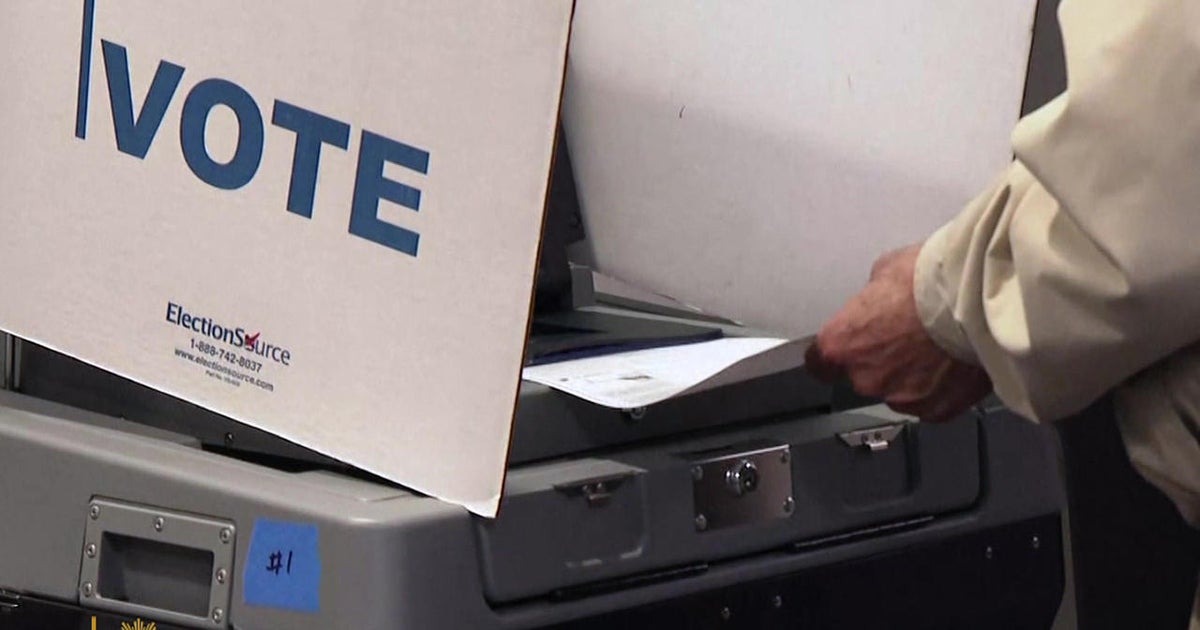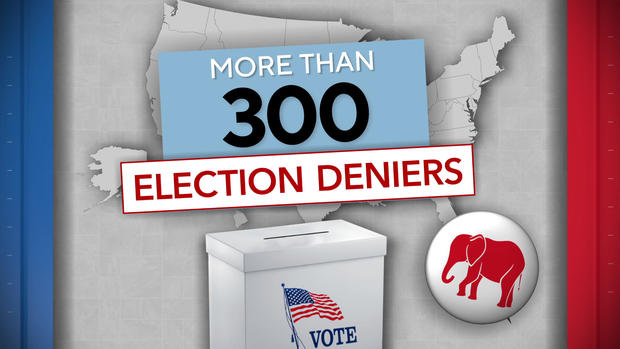Homecoming weekend at Penn State means the grills, the games, and families gathered together. It’s no wonder thousands make the pilgrimage to the grounds of Beaver Stadium in central Pennsylvania’s “Happy Valley.” And along with tailgating and Big 10 football, every two years there’s another autumn tradition: reporters ruining the fun, and asking about elections in this crucial battleground state.
But beyond the issues that are dominating the headlines – the economy, crime, and abortion rights – some expressed another concern to CBS News chief election & campaign correspondent Robert Costa.
“Our very democracy is at stake in this election. and soon it could be taken from us,” said Kevin Naff. “And that’s what this election, I think, is about. Because when these election deniers come into office as secretaries of state and in roles where they control the process, and somebody wins an election that they don’t like, they’ll overturn it. And will we care then? It’ll be too late.”
Indeed, more than 300 Republican candidates for state and national office have been identified by CBS News as “election deniers” for having stated their refusal to accept the results of the 2020 presidential election as legitimate.
CBS News
And with the most prominent election denier in the land, former President Donald Trump, still ruling the Republican Party, it’s an open question how his followers will respond when the votes are counted in just nine days.
“Coming down from elites – from the former president, from leaders within the Republican Party, from many candidates – is the perpetuation of this idea that something was stolen, that these elections are not legitimate,” said Michael Berkman, a Penn State professor who directs the university’s McCourtney Institute for Democracy. They study what it takes to nurture democratic institutions, in the U.S. and abroad.
Costa asked, “In the United States people often say it can’t happen here, the rise of a hard-line, nationalistic, anti-democratic government. But could it?”
“Oh, absolutely,” Berkman replied. “I mean, I think that the thing to remember about democratic erosion is that it’s most likely to happen from within. We’re all watching what’s happening in Ukraine and impressed and proud of the Ukrainians, how they’re standing up and fighting for their democracy. But democracy doesn’t usually die through coups or invasion. It usually dies from within. An authoritarian-oriented leader is elected, and then they start to change the rules. They start to change who the other people in office are, start to change the referees. And you start to eat away at norms, start to eat away at guardrails. You start to erode people’s acceptance and the legitimacy of institutions that are essential to democratic rule.
“And you can end up in a very unfortunate place.”
The framers of the Constitution saw the free press as one of the pillars of representative government. In the words of Thomas Jefferson: “…wherever the people are well informed they can be trusted with their own government.”
But are today’s news organizations prepared to meet today’s moment?
Costa asked Margaret Sullivan, the former public editor of The New York Times and media critic at the Washington Post, “The Republican Party is gripped by people who are election deniers. How should the press contend with that? It’s happening inside one particular party.”
St. Martin’s Press
“Right. And we need to be very straightforward about saying that and pointing it out,” Sullivan replied. “Of course, we’re going to hold both parties to the same standards. It’s not that we’re on one team. We hold both parties to the same standards.
“But when one party is the one who’s doing this very troubling thing, we need to be straightforward about that. And if it causes criticism from the right, that’s okay.”
Sullivan has a new book, “Newsroom Confidential,” in which she says the press has been reluctant to forcefully call out attacks on democracy for fear of being labeled “partisan.”
“How does the press cover it without sounding alarmist at every step?” asked Costa.
“I don’t think we’re nearly alarmist enough,” Sullivan replied. “I think we need to stop being asleep at the switch and sound the alarm more about what could happen if election denialists are, you know, in power and decide, ‘Oh, well, we only like the results of this election, but not that one.’ I mean, we no longer have a country anymore.”
Reihan Salam, president of the conservative Manhattan Institute, which focuses on economic policy, says the stakes of this year’s election are “profound.”
“When you look at the overhang from COVID and the various COVID relief measures, they have had a massive effect on our country’s fiscal future,” he said. “We may well be looking at a recession.”
Polls show Republicans could make major gains in 2022, but how would they use that power?
Salam shares the same “kitchen table concerns” as many Republican-leaning voters, but worries whether either party can deliver timely solutions: “Unfortunately, I don’t think that this election is going to be about policy. I think the election is overwhelmingly a reaction to the state of the economy. And if indeed conservatives get elected to Congress in large numbers, that is going to be a very serious challenge for them and ahead to 2024.
“Basically, we’re in this dynamic right now where our politics are on such a knife edge. Republicans could win, Democrats could win. So, it’s a total zero-sum dynamic in which the Democrats do not want to give a win to the Republicans, and vice versa.”
Washington gridlock is an old cliché, but like many clichés, it has basis in fact. Even amid the celebration we saw at Penn State, some were pessimistic that politics can affect any real change.
Lamar Shy told Costa, “A long time ago I actually believed in the system, but not anymore.”
“What broke your belief in the system?”
“None of the problems are ever solved,” he replied. “Everybody saying they’re gonna fix the economy, they’re gonna fix everything, health care. And everything is in shambles.”
With Election Day just ahead, can a lack of faith in our system become a self-fulfilling prophecy?
For those determined to participate in democracy – politicians, journalists, and voters – Margaret Sullivan says there’s a duty we all share: “Well, you can’t make people care, but you can explain the consequences to people. You can talk to people. I think we can ask people to be their best selves as American citizens. And that means being informed, and not dismissing the news. I hear so many people say, ‘I’m tuned out, I don’t want it anymore. It’s all negative. I don’t care.'”
Costa asked, “What do you say to them?”
“I say, if you want to live in this country and be a good citizen – and I think people do, that there is a deep sense of patriotism – that it’s important to be an engaged citizen, and to know what’s going on.”
For more info:
Story produced by Ed Forgotson. Editor: Mike Levine.
See also:






